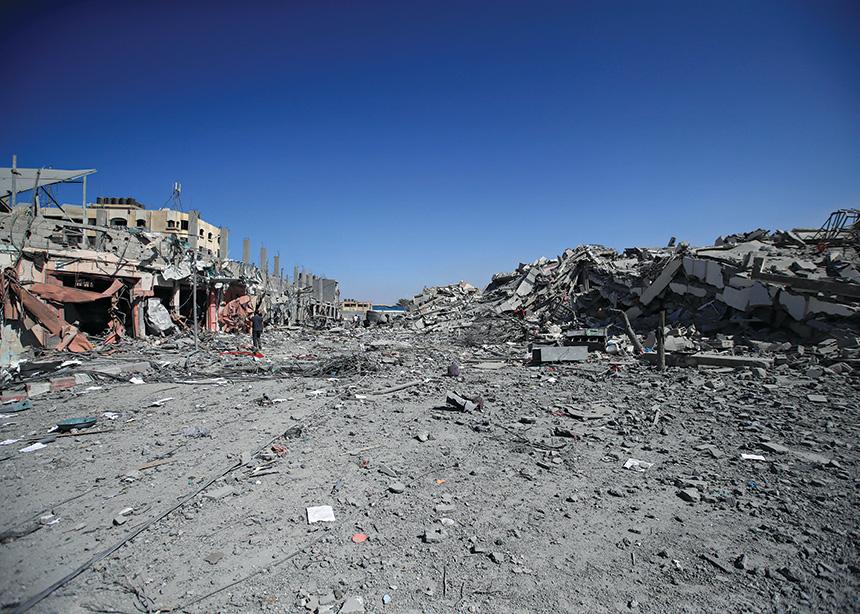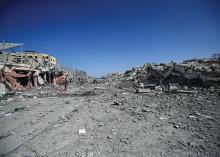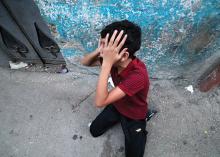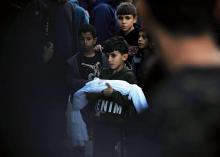What will Christmas be like in Bethlehem this year? What can we learn about the birth of Christ from those who live where he was born and where he lived?
Below, we share reflections on Christmas by Palestinian Christians. We asked them about Christmas in general and the words of Mary and Zechariah, from Luke 1, in particular. Mary speaks of the lowly lifted up; Zechariah speaks of “the dawn from on high” that will “give light to those who sit in darkness and the shadow of death.”
We are honoured by those who agreed to share deeply in these intense times. We also acknowledge Kathy Bergen, Joanna Hiebert Bergen and Byron Rempel-Burkholder, whose friendships with these people create a bridge between Palestine and our pages.
While Bethlehem is located in the West Bank, not Gaza, the anguish and fear of Gaza is shared by Palestinians in the West Bank and beyond. Plus, under cover of the war in Gaza, violence toward Palestinians in the West Bank has increased dramatically, with a reported 231 Palestinians killed there since October 7.
– Eds.
Hello God
I find myself reflecting on the words of Mary. While carrying Jesus in her womb, Mary said that God “looked with favour on the lowliness of his servant,” and “brought down the powerful . . . and lifted up the lowly.”
However, during these days in which it is the language of power that prevails, both financially and militarily, it seems the Lord is looking with favour on the powerful. They are getting more powerful while the lowly are becoming more lowly.
This phenomenon was so glaringly clear in the latest carnage on the Gaza Strip. Like Christ on the cross, the whole Palestinian population, who are mostly refugees from the 1948 Nakba felt hopelessly forsaken as their families, homes and institutions were continuously shelled.
The area now looks like it has been hit by an atomic bomb. The powerful international community, led by the U.S. and European countries, watched while the victims and the faithful cried out, wondering where the Lord was in the midst of all that was happening. He certainly was not with the lowly.
And that is why I felt like joining them with a few lines of Dolly Parton’s song “Hello God.”
Hello God
Are you out there? . . .
We really need you
We can’t make it without you Hello God
We beseech you
In the name of all that’s true Hello God
Please forgive us
For we know not what we do Give us one more chance
To prove ourselves to you Hello God
With all the devastation of the Gaza Strip, as well as the killing and suffering of so many people in the rest of the Occupied Territories during the last two months, all church leaders in the Holy Land decided to cancel Christmas festivities and limit them to church services and donations to the needy, to enable them to celebrate a Christmas meal with their families.
Maybe that will help us reflect on the true meaning of Christmas and not be driven by material or superficial festivities that we have borrowed from the Western world despite the humility of the birth of our Lord Jesus Christ in our country.
Nevertheless, Christmas has always been a joyful time of family gatherings, exchange of meaningful mementos and singing of carols. So during these difficult times we hope and pray that the spirit of Christmas will usher us into a new era of justice and peace worthy of this land called Holy by the birth, teachings, death and resurrection of our Lord Jesus Christ.
Samia Khoury co-founded the Sabeel Ecumenical Liberation Theology Center in East Jerusalem. Now 90 years old, Khoury served as the first president of the YWCA of Palestine and later as president of an elementary school, in addition to other roles in education and peace building.
Looking to heaven
In the ancient Roman Empire, the gods seemed always to be on the side of the prideful and powerful, but not in Mary’s song and Zechariah’s prayer. God is with those who are meek and humble.
Humility here is of those who have nothing but God to trust. They are those who have no power of their own, or they made the decision not to use power but to fully rely on God’s intervention to liberate them and bring order to a disorderly world.
Mary’s song and Zechariah’s prayer speak to Palestinians today. As Israel and its western partners continue to rely on their own power and their imperial network, Palestinians, on the other hand, look up to heaven and trust in a God who listens and sees, a God who is not threatened by the Empire, a God of light whom darkness cannot resist, a God who promises and delivers, a God whose Kingdom will bring about redemption and just peace for creation and humanity.
Yousef AlKhouri teaches at Bethlehem Bible College in Bethlehem. He is from Gaza, though he is currently studying in Europe. He visited Canada last year at the invitation of Mennonite Church Canada.
Longing for dawn
As a Palestinian who has been living for many decades under brutal military occupation, an apartheid regime, violence, suffering and a constant struggle for survival, the words of Mary and Zechariah offer me a message of hope, reassurance and promise of peace.
Mary’s words reflect an emphasis on God’s recognition of the marginalized and the oppressed. In the place where I live, these words remind us, Palestinians, that God sees and cares for those who are considered lowly or powerless in society. It provides comfort and a sense of worth to us who feel marginalized, abandoned and forgotten by many countries and churches amidst this genocidal war on Gaza and the Palestinians.
Zechariah’s words echo a longing for an end to darkness and death and a promise for a dawn which will bring us hope and new life. The light of God’s mercy and guidance will shine even in the darkest of times, providing a path toward justice and peace.
These verses do serve as a reminder for us that we are not alone in our struggle. The words speak of God’s favor and mercy, providing a source of strength, solace and a vision for a better future filled with prosperity and salvation.
Rifat Odeh Kassis is the Palestine candidate for the UN Committee on Rights of the Child, and the general coordinator of Kairos Palestine. He lives in Beit Sahour, just east of Bethlehem.
Do not fear
In the gospel accounts of the birth of Jesus, what strikes me most this year is the prevalence of fear. Fear is the first reaction of the characters in the stories: Mary’s encounter with the angel Gabriel (Luke 1:30), Joseph’s encounter in his dream (Matthew 1:20), King Herod and all of Jerusalem upon hearing the good news (Matthew 2:3), Zechariah’s encounter in the temple (Luke 2:13) and the shepherds’ reaction to the appearance of the angels (Luke 2:10).
While all of these actors are understandably afraid, they are assured that despite their fear, God is with them. They are our ancestors in faith.
In Luke’s account, an encounter with the sacred is met with fear. This teaches me that faith, specifically, a strong faith, can harness fear.
Characters in Luke’s account also represent the poor and lowly in their societies. Mary, a young girl from Nazareth—an unexpected place fraught with strife, resistance and trauma—finds favour in God’s eyes and becomes the medium of liberation. “For he has looked with favour on the lowliness of his servant. Surely, from now on all generations will call me blessed” (Luke 1: 48).
Zechariah and Elizabeth, an older couple serving in a small town in the Judean hills, receive a blessing from God at a time when society deem them retired.
The shepherds, nameless young boys most likely paid minimum wage to herd their landlord’s flock, are elevated to be among the first witnesses of God incarnate. Luke’s account of the birth of Jesus focuses on the reversal of unjust structural systems. “He has brought down the powerful from their thrones and lifted up the lowly” (Luke 1:52).
Many Palestinians have been living with fear. This has intensified since October 7. The unprecedented loss of life in Gaza, reaching more than 14,000 lives (at time of printing), is proof that Palestinian lives are viewed as disposable, worthless. Despite ongoing international support for a ceasefire, it seems no one is able to stop injustices against Palestinians.
In Luke, the angels tell the shepherds to “go and find a child wrapped in bands of cloth lying in a manger” (2:13). In past weeks, Palestinians have found many babies wrapped in bands of cloth pulled from the rubble. Some estimate that 6,000 children have died in Gaza so far.
As a Palestinian Christian, I ask, is it enough to know that “it will be better”?
I’m trying to make sense of the barrage of images and sounds of death: numerous images of Palestinian babies plucked from the rubble, babies with death certificates preceding their birth certificates, families being wiped out of the registry. We have been witnessing a high-speed and high-tech Nakba.
Amid the devastation, we cling to a thread of the promise that injustices will not remain.
Can we see in ourselves the charac- ters who played a positive role in the nativity story? Can we see something of Mary in ourselves—Mary who goes against social norms, embraces her fears head on, is displaced several times, sacrifices her body and youth to bring liberation to the world? Can we see Zechariah when we see God working
in our doubts to experience impossibilities? Can we see Elizabeth, who does not judge Mary but accepts her part in God’s plan?
We are reluctant to see in ourselves the spiritual leaders in Herod’s court, who were also afraid, but used their position and knowledge of scripture to be on the right side of power. Or the soldiers, who follow their rulers’ orders and massacre the children in and around Bethlehem. They killed innocent babies just because they were born in the same place as God incarnate.
Can we see these characters lurking within us as well, even if we do not want them to be there?
This is the context Palestinians face. Some of us are grieving the loss of loved ones. Others fear their loss.
And many of us are grappling with hope.
In this reality, we are afraid.
The Advent season is when we look to the stories of our ancestors of faith and respond to the promise that God is with us.
In this season, we Palestinians look to the stories of our ancestors’ fears and cry out: God be with us!
Shadia Qubti is a Palestinian Christian born and raised in Nazareth. She worked in faith-based peacebuilding and advocacy initiatives in Israel and Palestine for 15 years. She is a recent graduate of Vancouver School of Theology and currently serves as community engagement Animator at Trinity Grace United Church in Vancouver.
For discussion
1. Church leaders in the Holy Land have cancelled festivities this Christmas; how will the reality in Bethlehem inform your Christmas?
2. What questions do you have about the suffering that people in the Holy Land are experiencing?
3. Considering the Palestinian perspective, how do you interpret the words of Mary and Zechariah about the lowly being lifted up and the “dawn from on high” visiting those in darkness?
4. Mary speaks of the lowly and the powerful; which category do you see Christians in Canada fitting into? What is our role in bringing about God’s kingdom?
5. What is your prayer for Samia, Yousef, Rifat and Shadia?






Add new comment
Canadian Mennonite invites comments and encourages constructive discussion about our content. Actual full names (first and last) are required. Comments are moderated and may be edited. They will not appear online until approved and will be posted during business hours. Some comments may be reproduced in print.